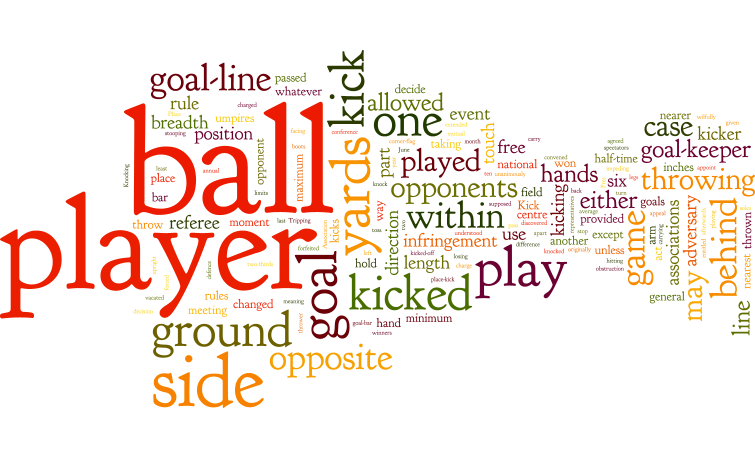The Laws of the Game are the name of the football rules. The rules of the association football. Since 1858 the rules of Sheffield FC exist, since 1863 the FA Rules. In the beginning the laws contained only a few sentences, in the meantime there are several pages with several illustrations for clarification.
The words of the Laws of the Game
Which words were frequently used in the early years for the Laws of the Game? What are the latest ones for the 2020/21 season? How has the frequency changed over the many decades?
The texts until 1924 are online in Wikisource, the remaining until 2020/21 I could determined by means of the annual editions of the Laws of the Game. In most editions the changed parts are marked. If the marking was missing in the booklet or if I was lacking the edition of the laws, then the minutes of the Annual General Meeting of The IFAB and my database with all changes specified there helped me. (I call this explicit because the amended text mentioned in the minutes does not always match the text in the following booklet of the Laws of the Game).
All too common words without football reference such as the, a, and, so, and so on, I have deleted from the resulting database.
The word evolution of the FA rules and the Laws of the Game
The result is the following Bar Chart Race:
The word evolution of the Sheffield FC Rules and the Sheffield FA Rules
I would like to add two more shorter Bar Chart Races for the development of the rules of Sheffield FC (1858-1867) and Sheffield FA (1867-1877). The latter were quite modern and progressive from our point of view today. Therefore it is worth comparing them with the early years of the FA Rules.
The word evolution of the LoG from revision to revision
If you just look at the changes in word frequency from revision to revision of the Laws of the Game, it goes like this:
The changes in the wording
In addition to the changes in the Laws of the Game, the wording has also been changed and adapted again and again. Especially in 1897 and 1898 there were many changes in the wording, namely 18. The last more frequent re-wordings happened with the revision of the Laws of the Game 2008, but only four.
The best known is the re-wording of the linesmen to assistant referees (1996). Furthermore, in 1898, misconduct no longer had to be willfully but intentionally to be punishable – this intentionally was then relaxed to deliberately in 1995.
Changes also clarify changes of the game (kicked to played, 1895), the clothes (boots to footwear 1973) and other things. For example, from 1938 onwards, the unauthorised playing of the ball with the hand was no longer described as knocked on but as propelled, and in the case of the dropped ball, since 1914 the ambiguous throw down has no longer been used in the legal text but drop down.
However, there need not be any changes in the translation into the respective national languages, because there are not always different counterparts to the English words. For example, so-called wilfully, intentionally and deliberately, which are all translated in German with the same word (absichtlich).
adversary → opponent (1897)
behaviour → conduct (1993)
beyond → out of (2008) → leave (2016)
boots → footwear (1973)
designation → logo (2008)
field → field of play (1898)
wilfully → intentionally (1898/1902) → deliberately (1995/2019)
intentionally obstruction → impeding the progress (1995)
kicked → played (1895)
knocked on → propelled (1938)
rule → law (1897), exception in law 6 (recent law 11, offside): laws → rules (1897)
linesmen → assistant referees (1996)
prevent → interfere with (1898)
proceed → be taken (2008)
spot → place (1898)
stopped by some outside agency → prevent by some outside agency (1960)
take place → occur (1898)
terminate → abandon (2008/2019) respectively terminate → suspend (1897)
throw down → drop down (1914)
won → scored (1897)

